iTOL Questions is a series of mini-blog posts that aim to answer common L&D related questions and provide help and support for L&D professionals.
The Issue:
As we highlighted in one of our previous posts, managerial staff within an organisation can make or break the training experience. The problem here is that they have numerous commitments within the organisation; they have to manage their staff, work to deadlines and take into account their budgets and productivity. This is where L&D comes in, the learning team in an organisation are the backbone of productivity, we fuel the fire behind efficiency and it is our role to keep everyone working to their full potential.
L&D professionals are the individuals who keep the gaps in knowledge and skills to a minimum, maintaining employee engagement and keeping everybody on the same page. However, as managerial staff have the power to release their employees onto a training course, they are in control of the way staff skills are managed.
Even the managers who are most supportive of training have to balance their responsibilities, and in turn have to keep the cogs of their unit turning. One step towards overcoming this issue is to get full support from the managers, as they have a direct influence on their employees.
The Solution:
The key to achieving the full support of training from managerial staff is to ensure that they are in some way involved. Getting them involved in the sessions and their construction is a sure-fire way to get them to invest in what you are trying to achieve. Ask them questions about the areas in which their staff are falling behind, engage with their concerns and present to them a reasonable solution that can come about through training. If they feel that they are somehow having an input into the training process then they will be more likely to understand the benefits and send their staff to training sessions.
The natural hierarchy of the workplace means that priorities and understanding trickles down from the top, when management staff make their objectives clear then the perceptions will transfer to their staff (in other words, if a manager thinks highly of L&D then generally their staff will as well). If you get the manager on board then the employees will be more than likely to take more from the session.
Help the management to understand that their staff will always be going through the learning process and with proper training that targets any issues or knowledge gaps it is certain that the staff will be learning the right things, rather than the bad habits.
Treat your relationship with the manager as a consultancy, after all you will be taking the role of an external examiner who comes in to measure the performance of the team and construct a training plan around that. Encourage the managers to guide and mentor their staff rather than simply telling them how it should be done.



